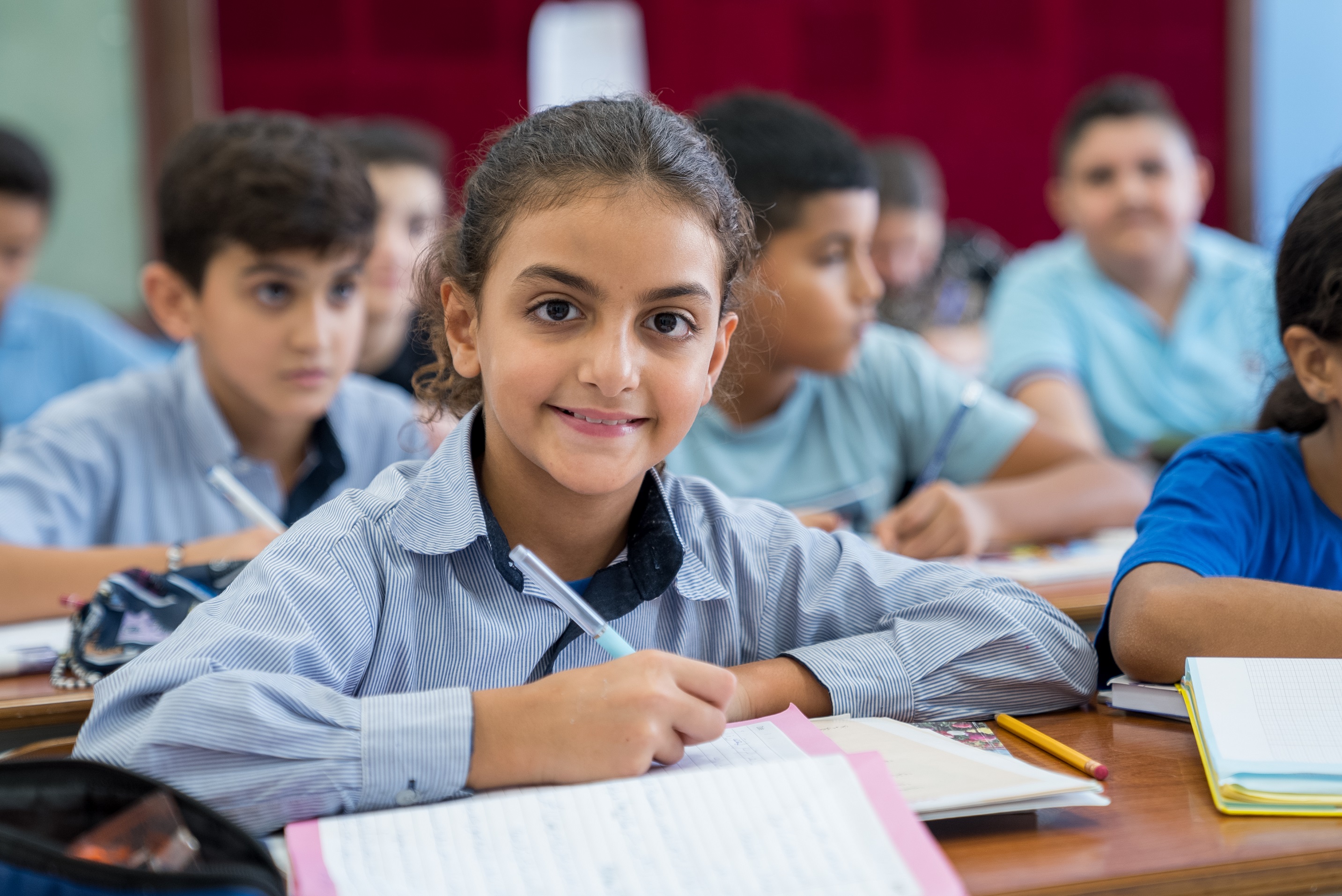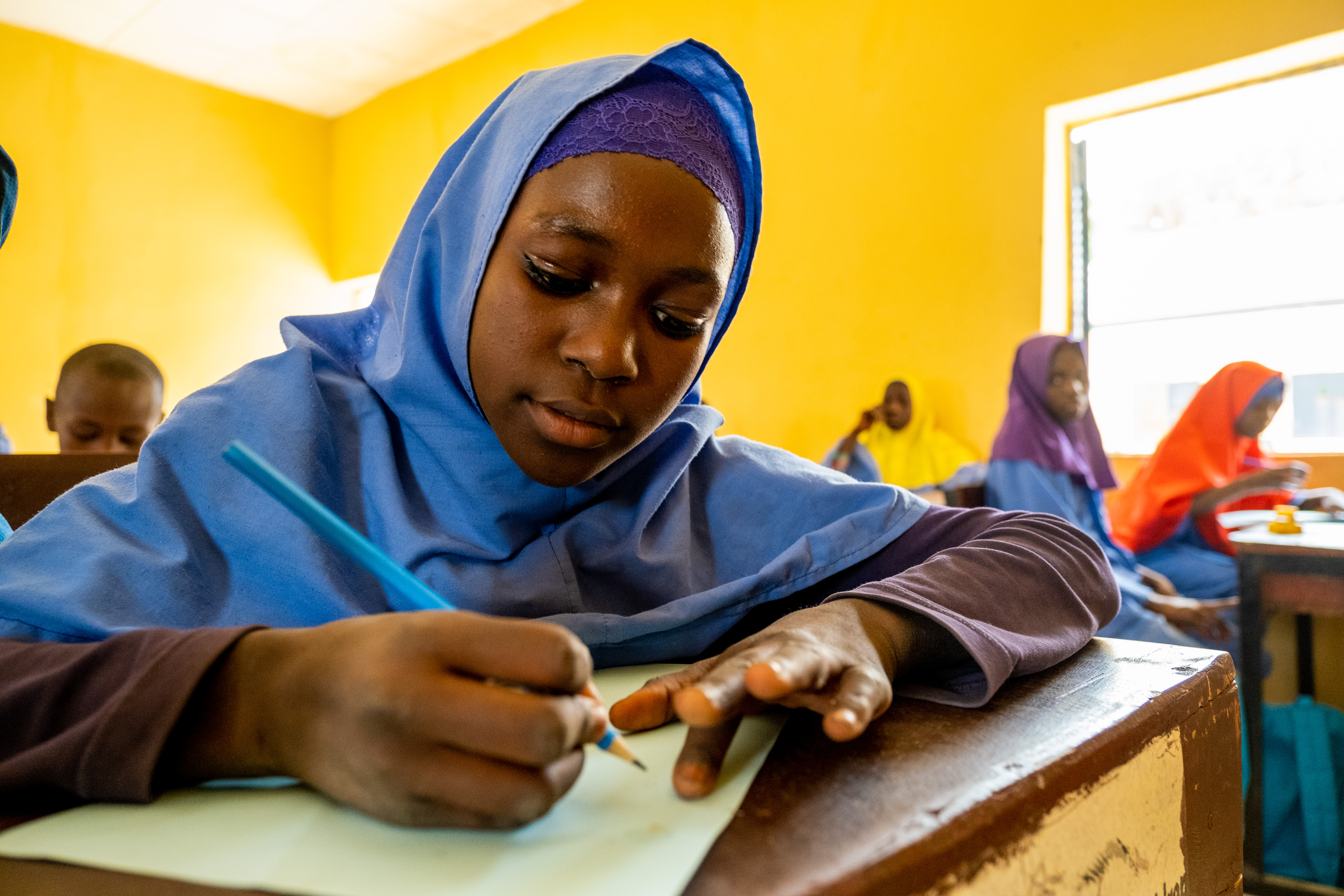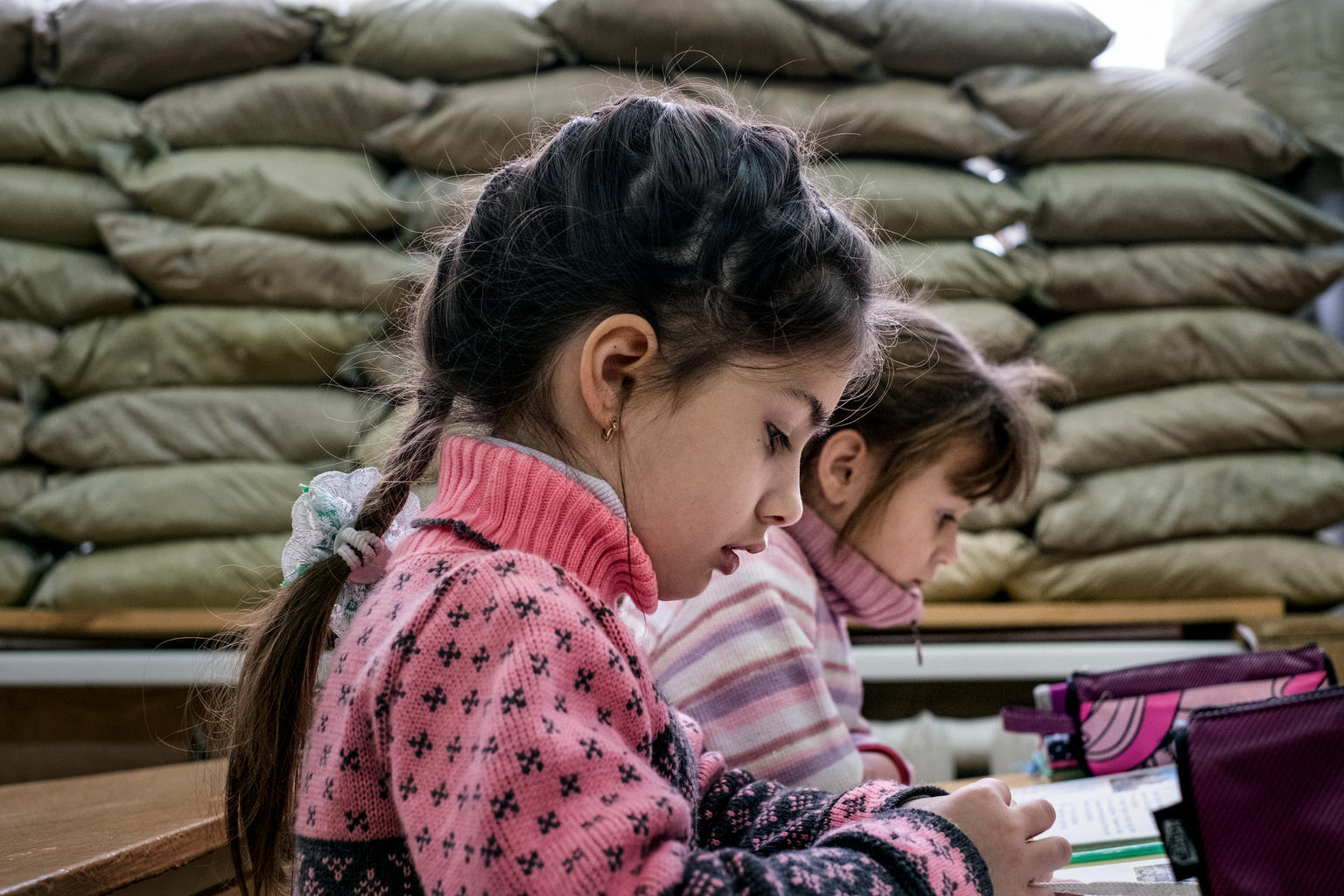‘Stronger Together in Crises’ – Education Cannot Wait Reaches 3.5 Million Children and Youth in Humanitarian Crises Worldwide
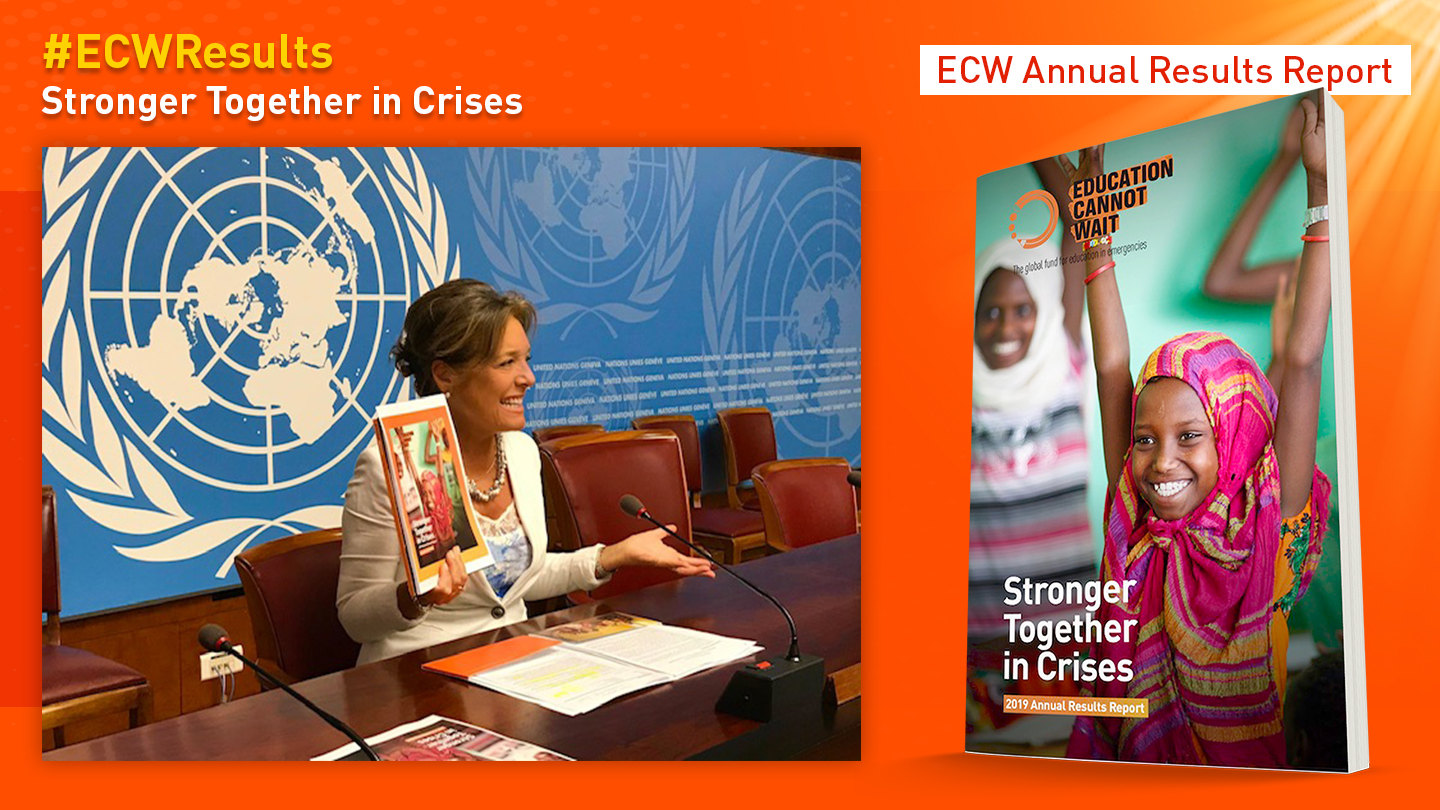
Amid the worst education crisis of our time caused by the COVID-19 pandemic, ECW’s new Results Report provides evidence on progress made in delivering inclusive, equitable quality education in emergencies and protracted crises
Education Cannot Wait launched its ‘Stronger Together in Crises – Annual Results Report 2019’ today, reaffirming itself as the global fund for education in emergencies and protracted crises. Since the Fund’s inception in 2016, its investments have reached nearly 3.5 million children and youth in many of the world’s worst humanitarian crises.
“Education Cannot Wait works to serve the 75 million children and youth – 39 million of whom are girls – whose education has been disrupted by armed conflicts, forced displacement, climate-change induced disasters and protracted crises. This new Annual Results Report shows ECW advancing from strength to strength, just three years into its operations,” said the Rt. Hon. Gordon Brown, UN Special Envoy for Global Education and Chair of the ECW High-Level Steering Group. “The report comes at an unprecedented time when the global education crisis is exacerbated by COVID-19. The pandemic has swept across the world, threatening decades of hard-won development gains: 90 per cent of the world’s school-age children and youth have had their education disrupted. As an innovative fund, Education Cannot Wait is breaking new ground, but more needs to be done. Financing is absolutely essential.”
The report provides evidence that ECW’s partnership model is spurring progress in delivering inclusive, equitable quality education for children and youth caught in emergencies and protracted crises. It shows growing political commitment for the emergency education sector and increased prioritization of education in humanitarian appeals: humanitarian funding for education grew five-fold from 2015 to 2019, with more than US$700 million committed in 2019. The share of funding dedicated to the education sector as part of the total sector-specific humanitarian aid globally also continued to rise, reaching 5.1 per cent in 2019.
To date, ECW has mobilized $662.3 million, including $252.8 million from both public and private donors in 2019. The Fund substantially increased its operations in 2019, disbursing $130.7 million to 75 grantees to support education in emergencies and protracted crises responses in 29 countries. The report shows that ECW is providing the impetus for quicker education responses in the face of sudden-onset crises, and is strengthening coherence between humanitarian and development aid interventions. It also captures encouraging trends in terms of strengthening national and local capacities to respond, as well as improving data, evidence and accountability for the sector.
ECW-financed education in emergency activities reached 2.6 million crisis-affected children and youth in 2019 alone. The Fund’s focus on the most vulnerable and marginalized children and youth is translating into real results: while girls often face additional barriers to access education in crises settings, nearly half of ECW’s beneficiaries (48 per cent) are girls. In all, 30 per cent of the Fund’s beneficiaries are refugees, 15 per cent are internally displaced children and youth, and 55 per cent are other crises-affected children and youth, including those from host communities.
“ECW champions the inherent human right to an education for children and youth left furthest behind in humanitarian emergencies and protracted crises,” said Yasmine Sherif, Director of Education Cannot Wait. “Our undivided focus is on the realities on the ground and the more than 75 million children and youth whose education is disrupted by crises. They demand our attention and action. Where there is commitment, progress has been made. The primary enrolment ratio for refugee children improved from 53 per cent to 75 per cent in Uganda in just two years; and, in Afghanistan, where 60 percent in our investments are girls, out-of-school girls now have the opportunity to return to the safety and protection of an education thanks to the government’s community-based education approaches and the partnership with civil society and UN agencies. Yet, to further scale up what works requires significant, urgent funding.”
Indeed, more remains to be done. Funding appeals for education in emergencies and protracted crises remained significantly underfunded in 2019, with only 43.5 per cent of the required funding secured; and, the gap risks widening further with the compounding effect of the COVID-19 pandemic and the stress it is exercising onto education and aid budgets worldwide.
“To answer the UN Secretary General’s recent call to avoid a generational catastrophe that could waste untold human potential, undermine decades of progress, and exacerbate entrenched inequalities, ECW and its partners are working to urgently mobilize an additional US$310 million to support the emergency education response to the COVID-19 pandemic and other ongoing crises. Together with in-country resource mobilization, this will allow us to reach close to 9 million children annually,” Sherif said.
In just the past four months of 2020, ECW’s total First Emergency Response investments span 33 countries and crisis-affected contexts, with a record amount of US$60.1 million rapidly allocated by ECW for vulnerable children and youth, who are now doubly impacted by COVID-19.
Highlights of Key ECW 2019 Results by Country:
- Afghanistan: A successful model of community-based education has reached 57 per cent of girls amongst its beneficiaries. An ECW grant to Save the Children and the Afghanistan Consortium for Community-based Education and Learning achieved substantial results in literacy and numeracy. At the beginning of the intervention, only 2 per cent of students were able to read a story and answer related questions correctly; after the intervention, 48 per cent of students were able to read and understand a basic story.
- Central African Republic: ECW partner, Norwegian Refugee Council, delivered an 8-month accelerated learning programme for 720 conflict-affected children (45 per cent girls). 85 per cent of children who completed the programme were able to re-enter the formal system after receiving the required certification.
- Democratic Republic of the Congo: ECW investments delivered through AVSI, NRC and UNICEF supported reintegration of formerly out-of-school children into formal education, protection for children at school and at home, the provision of psychosocial support, and upgraded school infrastructure and the distribution of learning materials. About 10,000 children attended catch-up courses and took the end-of-cycle exam for primary school, enabling them to re-join the formal education system. Exceeding targets, over 46,000 children have been reached in all, 49 per cent of whom are girls.
- Ethiopia: Following a US$15 million initial investment grant implemented through by UNICEF, the primary gross enrolment ratio for refugee children rose to 67 per cent, up from 62 per cent in 2018.
- Nigeria: ECW partner Street Child successfully increased learning levels in reading and mathematics in areas affected by the Boko Haram insurgency. The grant provided non-formal education for 5,206 children between the ages of 4 and 14 who were either out-of-school or had fallen behind in the formal education system. As a result of the intervention, the percentage of children who were able to recognize letters rose from 1 per cent to 50 per cent. The percentage of students able to read words increased from 9 per cent to 43 per cent.
- Uganda: Following ECW’s support to the Education Response Plan for Refugees and Host Communities (ERP) through the Fund’s multi-year resilience programme, the primary gross enrolment ratio for refugee children improved by 22 per cent – from 53 per cent in 2017 to 75 per cent in 2019 (reaching 71.4 per cent for girls).
- Yemen: 1.8 million students in war-torn Yemen were able to sit for their exams with support from Education Cannot Wait and its partners. Through an initiative implemented by UNCEF, 128,000 teachers received cash incentives.
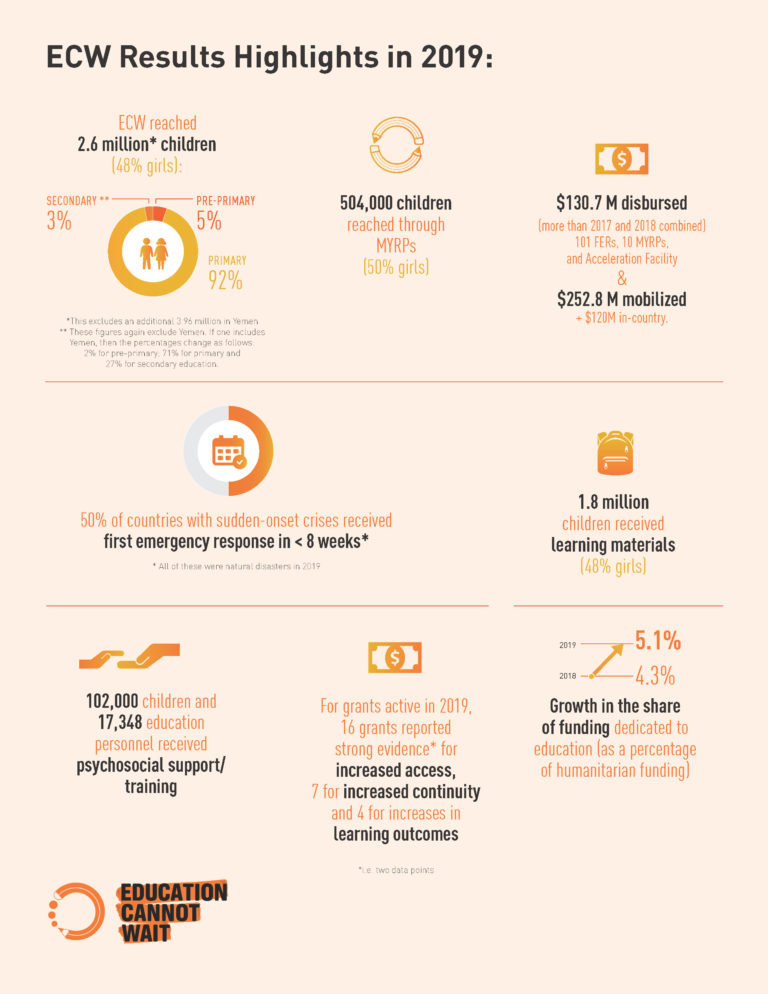
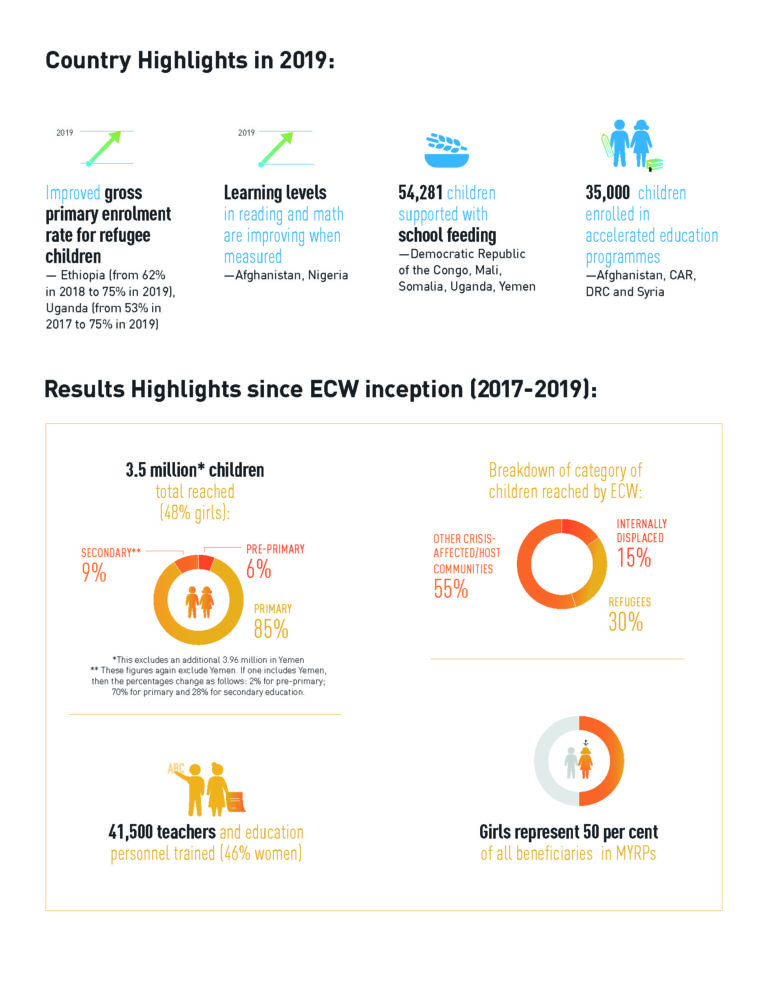
Relevant links to the report’s digital portal: www.educationcannotwait.org/annual-report
- Stronger Together in Crisis – 2019 Annual Results Report
- Executive Summary
- Human Interest Stories
- Results Infographics
For Press Inquiries:
Anouk Desgroseilliers:
adesgroseilliers@un-ecw.org
+1-917-640-6820
Kent Page:
kpage@unicef.org
+1-917-302-1735

